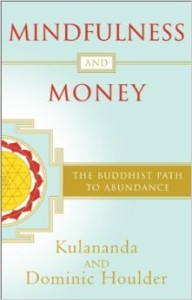 This article was originally published on November 6th, 2008. But even if we aren’t in the midst of an economic apocalypse, money is still on our minds.
This article was originally published on November 6th, 2008. But even if we aren’t in the midst of an economic apocalypse, money is still on our minds.
I was at the Evanston Public Library yesterday and I was blown away by how many books there on how to make, handle, invest, accumulate and basically do anything you want with money. I mean, whole shelves of them. Obviously this is something that is on people’s minds. Yet with the economic “meltdown” in the U.S. over the past few months, it’s pretty obvious that we are still relatively uneducated and foolish in the way we view and use money.
Mindfulness and Money is written from a Buddhist perspective on the financial world. It’s not the only Buddhist perspective, but it looks at personal finance through the lens of the traditions that have grown around the Buddha and his teachings. It does a great job of trying to bridge the gap between Buddhist thinking and the Western societies in which we live.
Big Thought
Money, and our relationship to money, is an important part of our human experience. It is neither good nor bad, but we must realize that money can’t “fix” our unhappiness. We must use it skillfully and develop an acceptance of our current condition.
Questions, Ideas, and Implications
- I think the most important sentence is the one that starts off the book: “Money is humanity’s greatest invention” (pg 1). In Western culture, with it’s Judeo-Christian roots, money is often seen as bad or troublesome. The idea of money as something that is good is powerful and I find it rather liberating. It’s challenging enough finding ways to operate as an economic entity without feelings of guilt or worry.
- The most relevant way the Buddhist perspective can help is as a counter to the materialism that characterizes much of our society. There is an inherent cultural belief right now that buying more stuff will make you happy (just watch TV commercials). There’s this idea that if you aren’t fantastically wonderful yet, all it will take is a new watch, cologne, car, pair of jeans, etc. There’s an unspoken promise that buying things or having things will make you complete; a promise that always disappoints. The Buddhist approach suggests a way to escape that cycle.
- I love the assertion that “Craving is something we choose to do” (pg. 50). A lot of times I think we feel controlled by our desires, that we have to go along with them. This reminds me that I have a choice to act or not act upon any desire that comes up.
- Another idea that has value is the idea of “skillfully” earning money. The idea of choosing a career based on the good that it will do for you and for the world is a lot more fulfilling than just choosing one based on salary. I have met many people who are unhappy with their career choices, but they continue on because they feel they have to. How can we choose work that is emotionally and financially fulfilling? I think the first step is awareness; simply being aware that there is more to work than money can start the process of finding an authentic career.
- In the last year, I’ve been asking myself questions about how I spend my money, and looking for ways to change my habits. For example, I still have a car, but I drive a lot less – I try to take public transportation or my bike because it’s less expensive and better for the environment. I’m realizing that there are a lot of ways that I can make small changes in my life to not need as much as I thought I did.
Should you read this book?
If you are searching for a new way to relate to money in your life, you will definitely find value in Mindfulness and Money. You don’t have to be a Buddhist to appreciate the value of it’s philosophies on how to earn and spend money, and it’s psychological understanding of how we interact with money is profound.
